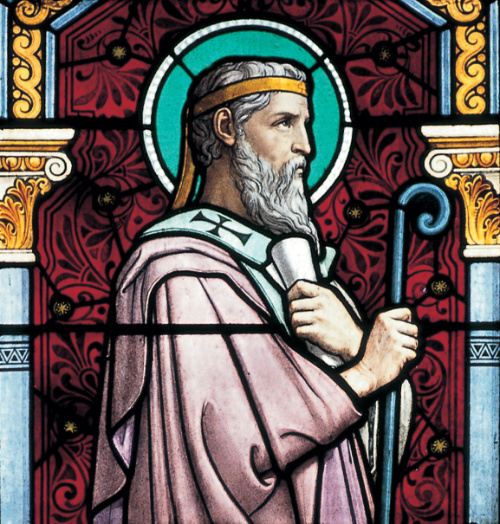
Last month, Pope Francis declared name St Irenaeus a “doctor” of the Catholic Church. But just who was this second century saint? DAVID ADAMS takes a look…

St Irenaeus, depicting in a window inside inside the Church of St Irenaeus in Lyon, France.
Believed to have lived in what is now France in the second century, St Irenaeus is hailed for his role in expanding the Christian communities under his care as well as for tackling heresy.
Born in the first half of the second century in the Greek city of Smyrna in what is now Turkey, Irenaous was brought up in a Christian family and had heard and seen the preaching of Polycarp in Smyrna (Polycarp in turn had known the Apostle John and is said to be the last known living connection to the apostles).
At some point Irenaeus travelled west and, during the persecution of the Christians under the Roman Emperor Marcus Aurelius, he served as a priest in Lyon (then known as Lugdunum) in southern France. In 177 he was sent to Rome as an emissary to Pope Eleutherius concerning the heresy of Montanism (named for its founder Montanus, it was seen as a heresy for its encouragement of new prophetic revelations).
While he was in Rome, the founder and first bishop of the church in Lyon, Pothinus (later St Pothinus), is said to have been seized along with several companions by a mob, taken before a magistrate and detained. He is believed to have died of the abuse he received in prison (others seized with him were killed by wild beasts in the city’s amphitheatre).
Irenaeus succeeded Pothinus as bishop on his return to Lyon. Little is known about his period as bishop nor is anything known of his death believed to be around the turn of the 3rd century. He was buried under the Church of St John in Lyon (later named St Irenaeus in his honour) but his tomb was destroyed by the Huguenots in 1562.
Irenaeus did leave numerous writings including Adversus haereses (Against Heresies). In a recent article, Joanne M Pierce, professor emerita of religious studies at the College of the Holy Cross in the US, said Irenaeus “wrote forcefully against a philosophical and religious movement called gnosticism – from the Greek word gnosis, or knowledge – which he saw as a heresy threatening to separate Christians from beliefs handed down by Jesus’ apostles”.
“Irenaeus argued against the gnostics, insisting God created both material and spiritual reality and that both were rooted in God’s goodness. His critique of the gnostic view of Christian teaching reaffirmed the importance of the teaching of the apostles, based on the writings of the Old Testament prophets and the four Gospels of Matthew, Mark, Luke and John. So Irenaeus’ teaching was valued by later theologians working to strengthen the church’s definition of orthodox beliefs.”
Interestingly, Irenaeus is said to have been the first to write that the Gospel of John was written by the Apostle John and the Gospel of Luke was written by Luke, the companion of Paul.
Irenaeus is viewed as a saint in the Roman Catholic Church as well as the Eastern Orthodox Church and Anglican Church. Pope Francis last month declared St Irenaeus a “doctor” of the Catholic Church, an honorific title given to less than 40 saints to date in recognition of the saint’s teachings, scholarship and writings. St Irenaeus was given the distinctive honorific title of “doctor of unity”.




